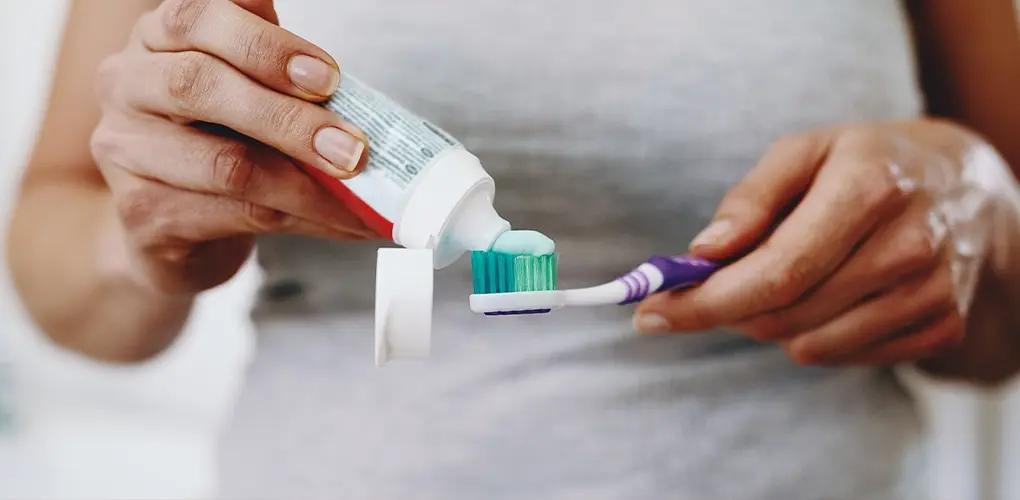`
Toothpaste
Toothpaste is an essential part of your daily oral hygiene routine and without it, can cause many dental problems. Toothpaste is a combination of different ingredients like:
- Fluoride → natural mineral to strengthen enamel and prevent cavities
- Humectant materials → prevent hardening of toothpaste
- Solid abrasive → removes food debris and polishes teeth
- Binding material → stabilizes toothpaste
- Sweeteners/ Flavoring agent → for taste only and do not contain sugar
- Surfactant → emulsify flavoring agents and foam up toothpaste
The composition of toothpaste may vary depending on the category of toothpaste, toothpaste brands, and purpose of toothpaste.
Types of Toothpaste
Every individual has unique dental needs. Different toothpastes are used for different purposes. Some of the basic types of toothpaste include:
Fluoride Toothpaste
Fluoride toothpaste is commonly recommended by dentists as it strengthens tooth enamel and prevents tooth decay. Fluoride toothpaste is beneficial for high-risk cavity individuals.
Whitening Toothpaste
Whitening toothpaste is widely used to remove surface stains and whiten the teeth. Whitening toothpaste is generally non-abrasive and safe to use. However, whitening toothpaste is not a substitute for professional whitening treatment. While whitening toothpaste is not suitable for severe tooth discoloration and patients with enamel erosion.
Sensitive Teeth Toothpaste
Dentists recommend desensitizing toothpaste for individuals with teeth sensitivity. Sensitive toothpaste typically contains agents like potassium nitrate or strontium chloride. These agents block nerve endings or form a protective layer over exposed dentine. Sensitive toothpaste may take up to four weeks for a better experience.
Natural Toothpaste
Natural toothpaste contains natural ingredients like baking soda or essential oils. It is an option for those who prefer natural products or have allergies to chemicals. Natural toothpaste is less irritating and environmentally friendly.
Tartar Control Toothpaste
Tartar control toothpaste prevents the formation of tartar or calculus. Tartar control toothpaste contains ingredients like zinc citrate or pyrophosphates to reduce tartar buildup. This type of toothpaste cannot remove existing tartar from teeth surfaces but helps prevent new tartar buildup.
Kids Toothpaste
Kids' toothpaste contains less fluoride because of the risk of ingestion. Children's toothpaste is less abrasive and comes in different flavors.
Benefits of Using Toothpaste
Toothpaste is important for oral hygiene. It removes plaque and bacteria from teeth that might result in cavities and gum diseases:
1. Prevents Cavities
Fluoride toothpaste strengthens tooth enamel and fights against cavities. Fluoride toothpaste inhibits the transformation of sugar into acids to attack tooth enamel.
2. Freshens Breath
Toothpaste eliminates bad breath-causing bacteria from the oral cavity and gives a feeling of freshness.
3. Removes Plaque and Tartar
Toothpaste removes plaque from teeth and gums. Regular brushing prevents plaque formation and tartar buildup.
4. Strengthens Enamel
Fluoride in toothpaste prevents tooth decay and strengthens enamel. Fluoride makes tooth enamel resistant to acid or bacteria attacks.
How to Choose the Best Toothpaste
The first thing you should keep in mind while choosing the best toothpaste is the product's safety and do what it claims. The United States Food and Drug Administration (FDA) authority regulates fluoride-containing toothpaste. FDA-approved toothpastes mention active ingredients, warnings, and other basic information.
Other considerations while choosing relevant toothpaste as per your oral needs include:
1. Ingredients
Look for active ingredients present in toothpaste. FDA-approved toothpastes display a list of active ingredients and drug facts on the packaging.
2. ADA Approval
ADA-approved toothpaste indicates that the manufacturer has taken approval regarding toothpaste’s safety and effectiveness. ADA never approves sugar-containing toothpaste.
How to Use Toothpaste Properly
Brushing your teeth helps remove plaque and bacteria that continually form on teeth and around the gumline. A proper brushing technique can protect teeth from decay and disease.
Following are the steps to proper brushing:
Lubricate the head of the toothbrush with water and take a pea-sized amount of toothpaste on the toothbrush.
Place the toothbrush at 45 angles to the gums and start a circular motion from the gum line towards the occlusal edge. Brush all the teeth (front and back) in the same manner.
Brush your tongue and don’t rinse with water after brushing because it will wash off the needed fluoride.
Brushing 2 minutes every day is essential for proper teeth cleaning and plaque removal.
It is recommended by the American Dental Association that brushing should be done twice daily to maintain oral hygiene.
Recommendations for Children
Develop brushing habits in children by the age of 2 or 3. Always remember children under 3 years of age should be given fluoride-free toothpaste and smaller amounts compared to adults. And mothers should wipe the teeth after breastfeeding for children less than one year
DIY Toothpaste
There is no need to stick to company-made or generic toothpaste. You can make your homemade toothpaste with coconut oil, baking soda, or charcoal.
Benefits of Homemade Toothpaste
- No consumption of plastic packaging
- Cost-effective
- Natural ingredients
- Reduced artificial ingredients
- Customizable flavor and abrasiveness
`

